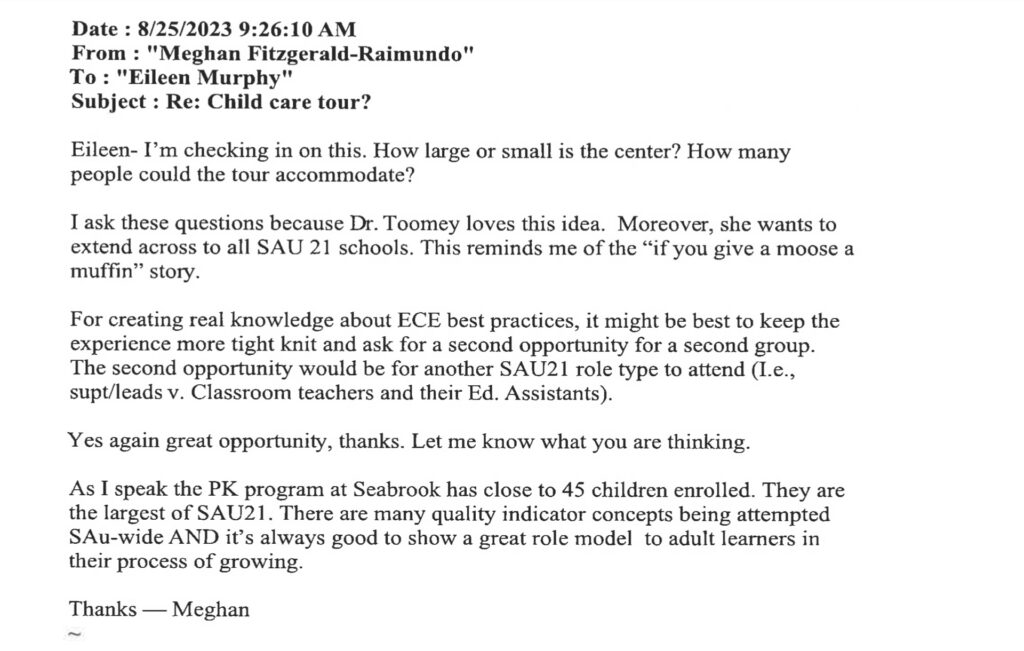The Seabrook School Board has been challenging the implementation of the Community School Model for their school. While Community Schools sound good for families, that’s not the case.
Community Schools were developed by the CDC for public schools. They are called Whole School, Whole Community, and Whole Child schools. Essentially, parents are marginalized because some people believe that public schools can do a far better job of raising children. Read more about that here.
While that may be the case for some neglected children who attend public schools, that’s not the case for all Seabrook families. Over the past year, Seabrook parents have been attending school board meetings and asking the administrators to focus on academics (low proficiency scores) and persistent bullying.
I recently wrote to the Superintendent in SAU21 about the Community School Model and questioned why this is a priority for Seabrook. I mentioned the numerous problems that erupt when reformers turn public schools into medical and mental health clinics for children. New Hampshire couldn’t even vaccinate children properly last year. Two NH children were vaccinated after their parents told the schools NOT to vaccinate their children. When parents are absent or removed from the process, expect big mistakes to occur. Years ago in PA, 6th-grade girls were forced to undergo a vaginal exam without their parent’s knowledge or consent.
The School Board members in Seabrook have been questioning and pushing back on the grant money that will be used to implement the Community School Model. I attended a school board meeting recently where the administrators made it sound like this is all about expanding preschool. Why would anyone care about expanding preschool for children? (Discussion starts at 21:30)
While I’m not opposed to preschool, expanding preschool doesn’t address the pressing problems in the school. It may provide free daycare for working families, but there was no mention of using the $1.3 MILLION dollars in federal aid for working families. One gets the impression that preschool is so important that they must accept the federal money in order to improve the quality of education in the school. Nothing can be further from the truth.
Studies have shown that preschoolers do not make long-term real academic gains. In fact, preschool is supposed to be more about socializing than academics anyway. So how does that help with the problems that plague this school?
Years ago, a Head Start Study, which I included in my email to the Superintendent here, exposed the fallacy of pushing universal preschool. Head Start showed no lasting value to children. Education researchers pointed to the need to focus on elementary and secondary schools.
Sci-Tech Daily recently ran an article reporting on a study from Teachers College, Columbia University, the University of Virginia, the University of California-Irvine, and the University of Delaware That Revealed the Varied Impact of Preschool Programs on Long-Term School Success.
The study, “Unsettled Science on longer-run effects of early education,” published today (May 2) in the journal Science, examined published evaluations of well-established, publicly funded preschool programs using rigorous designs. The four evaluations reported a mix of positive, negative, and no differences in the school performance of children who did and did not attend preschool programs in elementary school and beyond.
AND
Although most recent evaluations show public preschool programs improve literacy and math skills at school entry, that advantage fades quickly after children enter elementary school.
This is essentially what the Head Start Study showed, too.
So why is the federal government moving forward with money for schools to implement the expansion of preschool? Maybe it’s not really about preschool as we’ve been led to believe.
When the Principal of Seabrook resigned recently, he admitted that it was because the board wasn’t supporting the mental health of the students. HUH? I thought this was about preschool. Now the Principal is saying this money is to support the students’ mental health. I’m not surprised, with the Community School model, public schools become mental and medical clinics but with a long list of problems that follow.
What else did they have in store for Seabrook and SAU21?
I filed a 91-a Right to Know Request asking to see emails that were exchanged on this federal grant. Within one of the emails you will find a link to the U.S. Department of Education. The US DoE provides a short video on how to implement “logic models.” If you fast forward to about the 12-minute mark, you can see how they plan to collect data on the students and track them through their lifetime. No students are exempt, and there’s no way to opt out. Community School grant money has been sent to Manchester, Seabrook, Ringe, and Concord.
As you can see from these emails, the goal wasn’t just to expand preschool but to begin with infants and expand it to all of the schools in SAU21.


Do we have an integrity problem in SAU21?
The board wasn’t told this; they were told it was all about expanding preschool. Go here and listen at the 21:30 mark. This is beginning to look like an integrity issue with the SAU21 administrators. The Seabrook School Board then voted to review all grant applications in excess of $25k. They want to make sure that they agree with what the administrators are doing.
This really wasn’t about expanding preschool at all. This is exactly what the CDC envisions for all schools: Cradle to Grave, where the government promises to take care of us from the cradle to the grave. They are going to collect and share data on your children from birth through their careers.
What’s the problem with that?
Emmett McGroarty, an attorney, described to the U.S. Commission on Evidence-Based Policymaking in Washington, D.C., that the federal government’s data mining can have an intimidating effect on individuals, even if the data is never used.
